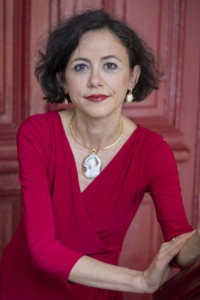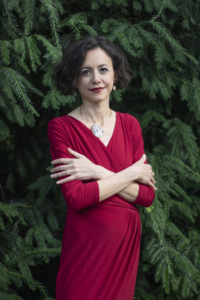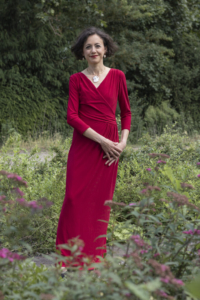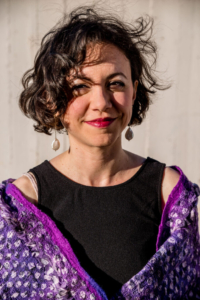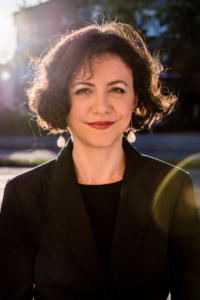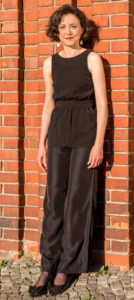Biography
Cecilia Sala, born in Milan, approached the world of classical singing as soloist soprano of the vocal quartet “Santa Tecla” of Milan’s cathedral. Together with the diploma in baroque singing at the “Accademia Internazionale della Musica” (2008, prof. Roberto Balconi) she attended various masterclasses in Italy (with Sergio Foresti, Roberta Invernizzi) and Austria (Austria Barock Akademie). Pupil of the mezzo-soprano Bianca Maria Casoni, she performed as a soloist and with chamber choirs in several music festivals such as “XXVII Festival delle Nazioni di Città di Castello“, le “Settimane Musicali di Stresa e del Lago Maggiore” and “Suoni entro le mura”. With the ensemble “Il Canto di Orfeo” she recorded music of Giacomo Carissimi and Antonio Vivaldi. In 2008 she moved to Berlin, where she studied with Birgit Wagner and Sibylle Fischer and works as a soloist. In 2012, 2013, 2014 and 2018 she gave a recital at the Mozarthaus (Mozart House) in Augsburg with the pianist Stephanie Knauer. Since 2010 she´s been an Italian language coach for operas: she already worked with the Musikfestspiele Potsdam for the baroque Opera “Calandro“ by Ristori and for the Kammeroper Schloss Rheinsberg for Puccini’s “Tosca”. Between 2012 and 2017 she worked as Italian teacher at the „Carl Maria von Weber“ conservatory in Dresden and in 2017 she was lecturer for “Italian for the Opera” classes at the Udk Berlin. In 2018 she worked as a prompter for Sciarrino´s “Luci mie traditrici” for the Theater Lübeck. In addition to that she works as a translator for musicology and singing teacher in Berlin and is a voice therapist.
Audio
Photo Gallery
Press
“The performance was excellent but the best, with the conductor, was the charming and melodious voice of the soprano soloist, which was highly appreciated by the public”.
Paolo Rossi, R.A.I. Auditing s.a.s
“Both affects, the merry and the tragic, expressed from Cecilia Sala with an instrumental and crystalline voice, differentiating the styles without forcing the contrast in an almost romantic way.”
Claus Lamey, Ausgburger Allgemeine
“Cecilia Sala contained her voice in a delicate ‘mezza voce’, increasing yet the expressive intensity in any direction, from carefree irony to the deepest pain. ‘She never told her love’ was particularly moving.”
Claus Lamey, Ausgburger Allgemeine
“Cecilia Sala presented herself with a remarkable vocal brilliance, an agile temperament and the charming charisma of a born “Opera-buffa” interpreter.”
Claus Lamey, Ausgburger Allgemeine
“His aria” Komm in mein Herzenshaus ” offered Cecilia Sala the possibility to unfold the brilliance of her voice. Flexibility, sober yet luminous coloraturas, sensitive emphasis on the text and a subtle expression of the affects shaped the singing “.
Thomas Janssen, Elbe-Jeetzel-Zeitung
“Cecilia Sala showed again musical brilliance in both pieces, using pointed coloraturas and subtle color shades “.
Thomas Janssen, Elbe-Jeetzel-Zeitung
Concert Programs
Programs with fortepiano
Freemasons and Revolutionaries
Songs and arias by Gluck, Mozart and Haydn
Georg Willibald Gluck (1714-1787):
Einem Bach, der fließt
Klopstocks Oden und Lieder beym Clavier zu singen
- Der Jüngling
- Die Sommernacht
O del mio dolce ardor
W. A. Mozart (1756-1791):
Fantasia No. 3 in D minor for solo piano K. 397
W. A. Mozart (1756-1791):
Sämtliche Lieder
- An die Freude
- An die Einsamkeit
- Ich würd auf meinem Pfad
- Lied der Freiheit
- Abendempfindung
- Ridente la calma
Jean-Frédéric Edelmann (1749-1794):
Sonata 6 Op. 1 in F Sharp for solo piano:- Andante
Joseph Haydn (1732-1809):
Aria da “Il Canzionere” di Francesco Petrarca
Duration: 70 Minutes
Le dimore amor non ama
Songs and arias by Haydn and Giuliani
Franz Joseph Haydn (1732-1809) :
VI Original Canzonettas (1794)
- The Mermaid´s Song
- Recollection
- A Pastoral Song
VI Original Canzonettas- Second Set (1795)
- Sailor´s Song
- The Wanderer
- She never told her love
- Piercing Eyes
Leopold Mozart (1719-1787) and Johann Ernst Eberlin (1702-1762):
The Morning and the Evening
Wolfgang Amadeus Mozart (1756-1791):
Gigue in G major, K. 574 “Eine Kleine Gigue”
Mauro Giuliani (1781-1829):
Sei ariette su poesia di Metastasio
- Ombre amene
- Fra tutte le pene
- Quando sarà quel dì
- Le dimore amor non ama
- Ad altro laccio
- Di due bell’anime
Duration: 70 Minutes
Peace Celebration
Sacred odes, songs and arias by C.P.E. Bach and Mozart
C.P.E. Bach (1714-1788):
Geistliche Oden und Lieder Wq 194/ Wq 195
- Das Glück eines guten Gewissens
- Geduld
- Danklied
- Der tätige Glaube
- Um Ergebung in den göttlichen Willen
- Die Liebe des Nächsten
- Das Gebet
- Trost der Erlösung
- Der Weg des Frommen
- Gelassenheit
- Der Kampf der Tugend
- Die Zufriedenheit im Gott
Franz Joseph Haydn (1732-1809):
Sonata (Divertimento) Nr. 12 A major Hob. XVI/12 (Andante, Minuet, Finale)
Wolfgang Amadeus Mozart (1756-1791):
Ergo interest- Quaere superna K.143/73a
Die Schuldigkeit des ersten Gebotes
- Hat der Schöpfer dieses Leben
Duration: 70 Minutes
Programs with ensemble
Laudate Dominum
Sacred and secular music from Renaissance to Classicism
J. Dowland (1563-1626):
Can she excuse
Flow, my tears
Come, heavy sleep
C. Monteverdi ( 1567-1643):
Laudate dominum
Quel sguardo sdegnosetto
W.A. Mozart (1756-1791):
Agnus dei
A. Vivaldi (1678-1741):
Sonate in B
A. Ariosti (1666-1729):
La rosa – Cantata
M.A. Ziani (1653-1715):
Quel sembiante così bello
Duration: 60 Minutes
Instrumentation: organ, trombone, soprano
Alma redemptoris mater
Concert for Soprano, Trombone and Organ
Emperor Joseph I. (1678-1711):
Alme ingrate
J. Haydn ( 1732-1809):
Flötenstücke
W.A. Mozart (1756-1791):
Agnus dei
Ergo Interest, an quis- Quaere Superna
Leopold Mozart (1719-1787):
Adagio
C.P.E. Bach (1714-1788):
Allegro in F major
Das Gebet
Adagio in C minor
Trost der Erlösung
Danklied
Johann Joseph Fux (1660-1741):
Alma redemptoris mater
Duration: 60 Minutes
Instrumentation: organ, trombone, soprano
Programs with organ
Luther’s Reflections
Music of the Reformation Era
J.S. Bach (1685-1750):
Fantasy in G-major BWV 572
Komm in mein Herzenhaus BWV 80/2
M. Luther (1483-1546)
Ein feste Burg ist unser Gott
J.S. Bach (1685-1750):
Nun komm der Heiden Heiland BWV 622
Der Tag, der ist so freudenreich BWV 605
Jesus Christus, unser Heiland, der den Tod überwand BWV 626
Erstanden ist der heilige Christ BWV 628
Toccata and fugue in d BWV 565
Johann Ulrich Steigleder (1593-1635)
Vater Unser im Himmelreich
Heinrich Schütz (1585-1672)
O süßer, o freundlicher SWV 285
Michael Praetorius (1571-1621)
Nun lob mein Seel den Herren
Heinrich Schütz (1585-1672)
Eile mich, Gott zu erretten SWV 285
Michael Praetorius (1571-1621)
Sinfonia
Heinrich Schütz (1585-1672)
Ich will den Herren loben SWV 306
Joachim Neander (1650-1680)
Lobe den Herren
Duration: 60 Minutes
Programs with organ and cembalo
On request

